The International Institute of Humanitarian Law (IIHL), in co-operation with the International Committee of the Red Cross (ICRC), hosted the 40th Roundtable on Current Issues of International Humanitarian Law from 7 to 9 September 2017 in Sanremo, Italy, marking the 40th anniversary of the 1977 Additional Protocols to the Geneva Conventions.
The Roundtable comprised three days of panel discussions on international humanitarian law (IHL) and the Additional Protocols, on topics including the conduct of hostilities, treatment of persons deprived of their liberty, and sexual and gender-based violence in armed conflict.
In a panel dedicated to “The Contribution of the ICTY to IHL”, ICTY Vice-President Judge Liu Daqun and Judge Fausto Pocar, current President of IIHL and Judge of the ICTY Appeals Chamber, were joined by Professor Patricia Sellers Viseur, advisor to the Prosecutor of the International Criminal Court and former staff member in the ICTY Office of the Prosecutor, and Dr Suzannah Linton, a Distinguished Professor at Zhejiang Gongshang University's Law School and a former staff member in the ICTY Chambers.
Moderated by ICTY Registrar John Hocking, the distinguished panelists discussed different facets of the ICTY’s legacy in respect of IHL and the Additional Protocols. Reflecting on this, Registrar Hocking stated that: “With its groundbreaking rulings - from wartime sexual violence to cultural heritage destruction - the ICTY has inspired and given durable tools to courts, policy makers and civil society all over the world, which today make the ICTY’s legacy immortal and the global fight for justice irreversible. Among these tools is the ICTY’s pioneering contribution to the development of international humanitarian law.”
In a dynamic discussion, Judge Liu delved into the ICTY’s relevant jurisprudence, emphasizing that “the ICTY has significantly contributed to the application of the Additional Protocols and more broadly the development and understanding of international humanitarian law”. In this respect also, Judge Pocar noted that “One of its greatest achievements has been to apply the grave breaches regime not only to crimes committed in international, but also to the violations committed in non-international armed conflicts, expanding its application beyond Geneva Conventions and Additional Protocol I, and thus contributing to a coherent and consistent system of international criminal law with respect to armed conflicts and in international humanitarian law."
Professor Sellers assessed the ICTY’s significant contributions in prosecuting sexual violence, particularly rape, during armed conflict, as well as the way a gender analysis has driven genocide jurisprudence over the life of the Tribunal. Finally, Professor Linton illuminated the impact of the ICTY’s jurisprudence regarding IHL and the Additional Protocols on hybrid courts and domestic trials, particularly in the Asia-Pacific region.
This panel discussion is part of the ICTY Legacy Dialogues series of legacy and closing events, aimed at ensuring that the Tribunal’s contribution to accountability for international crimes endures long after its doors have closed.


